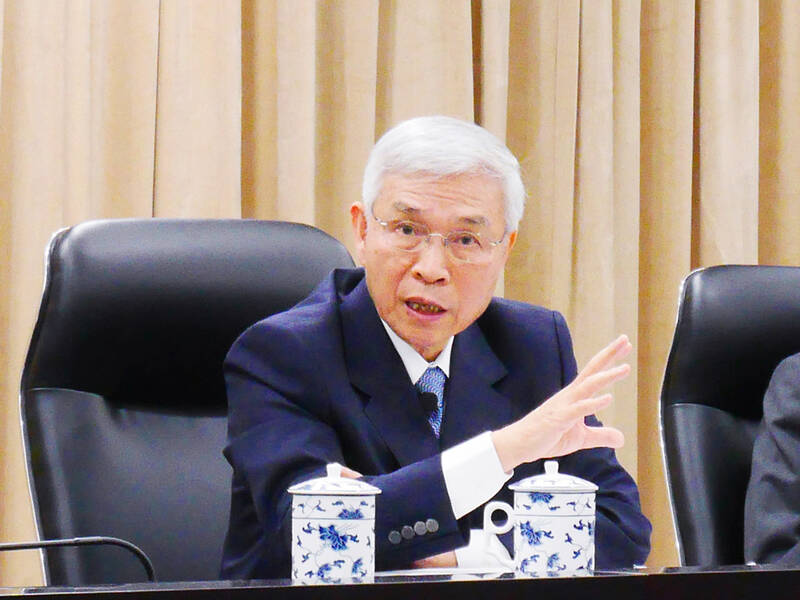Central bank Governor Yang Chin-long (楊金龍) yesterday defended the 2.6 percent return on its management of foreign exchange reserves as “prudent,” as lawmakers considered it overly conservative and proposed allocating 10 percent of the reserves to create a sovereign wealth fund to put the money to better use.
Yang made the remarks during a legislative hearing on proposals to put the central bank in charge of running a sovereign wealth fund as suggested by Taiwan People’s Party Legislator Cynthia Wu (吳欣盈) and colleagues.
“The 2.6 percent return falls in line with the central bank’s emphasis on safety and liquidity, and the yield would be 4.34 percent after factoring in compound benefits,” Yang told the hearing.

Photo: Chen Mei-ying, Taipei Times
Taiwan is the world’s fourth-largest holder of foreign exchange reserves at US$560.2 billion, behind China, Switzerland and Japan, helped by the central bank’s management skills, the monetary policymaker said.
Yang said it is unfair to compare the central bank’s management performance with sovereign wealth funds that have a greater risk appetite in pursuing returns.
The central bank is mandated to maintain stability in the local currency, the financial market and inflation, Yang said.
In line with that mandate, the central bank values safety and liquidity above other concerns as Taiwan is not a member of the IMF, which lends a helping hand when member states such as South Korea ran into solvency problems, the governor said.
Still, the central bank makes stable contributions annually, averaging 8.96 percent of overall revenue, to the national treasury, higher than Japan’s 0.66 percent, South Korea’s 1.1 percent, Switzerland’s 4.3 percent and Singapore’s 5.96 percent, Yang said.
Most central banks register uneven surpluses, because they opt for higher risks in pursuit of yields, he said.
Chinese National Party (KMT) Legislator Lo Ming-tsai (羅明才) said the central bank should have increased its gold stake and reaped a steep return of 20 percent this year.
Yang disagreed, saying that from 1989 to this year, the central bank’s gold holdings generated a return of 4.7 percent, with a volatility of 15.1 percent.
Furthermore, gold accounted for 4.81 percent of foreign exchange reserves in Taiwan, higher than China’s 4.13 percent, Japan’s 4.78 percent, Singapore’s 4.76 percent and South Korea’s 4.66 percent, Yang said.
US government bonds have proved a more robust investment tool, generating a 5.1 percent return with 4.6 percent volatility, he said.
Taiwan’s large foreign exchange reserves came from massive fund inflows induced by quantitative easing of major central banks to cope with recessions, Yang said, adding that the central bank needs sufficient reserves to keep the local currency stable in such times.

PROTECTION: The investigation, which takes aim at exporters such as Canada, Germany and Brazil, came days after Trump unveiled tariff hikes on steel and aluminum products US President Donald Trump on Saturday ordered a probe into potential tariffs on lumber imports — a move threatening to stoke trade tensions — while also pushing for a domestic supply boost. Trump signed an executive order instructing US Secretary of Commerce Howard Lutnick to begin an investigation “to determine the effects on the national security of imports of timber, lumber and their derivative products.” The study might result in new tariffs being imposed, which would pile on top of existing levies. The investigation takes aim at exporters like Canada, Germany and Brazil, with White House officials earlier accusing these economies of

EARLY TALKS: Measures under consideration include convincing allies to match US curbs, further restricting exports of AI chips or GPUs, and blocking Chinese investments US President Donald Trump’s administration is sketching out tougher versions of US semiconductor curbs and pressuring key allies to escalate their restrictions on China’s chip industry, an early indication the new US president plans to expand efforts that began under former US president Joe Biden to limit Beijing’s technological prowess. Trump officials recently met with their Japanese and Dutch counterparts about restricting Tokyo Electron Ltd and ASML Holding NV engineers from maintaining semiconductor gear in China, people familiar with the matter said. The aim, which was also a priority for Biden, is to see key allies match China curbs the US

Teleperformance SE, the largest call-center operator in the world, is rolling out an artificial intelligence (AI) system that softens English-speaking Indian workers’ accents in real time in a move the company claims would make them more understandable. The technology, called accent translation, coupled with background noise cancelation, is being deployed in call centers in India, where workers provide customer support to some of Teleperformance’s international clients. The company provides outsourced customer support and content moderation to global companies including Apple Inc, ByteDance Ltd’s (字節跳動) TikTok and Samsung Electronics Co Ltd. “When you have an Indian agent on the line, sometimes it’s hard

‘SACRED MOUNTAIN’: The chipmaker can form joint ventures abroad, except in China, but like other firms, it needs government approval for large investments Taiwan Semiconductor Manufacturing Co (TSMC, 台積電) needs government permission for any overseas joint ventures (JVs), but there are no restrictions on making the most advanced chips overseas other than for China, Minister of Economic Affairs J.W. Kuo (郭智輝) said yesterday. US media have said that TSMC, the world’s largest contract chipmaker and a major supplier to companies such as Apple Inc and Nvidia Corp, has been in talks for a stake in Intel Corp. Neither company has confirmed the talks, but US President Donald Trump has accused Taiwan of taking away the US’ semiconductor business and said he wants the industry back